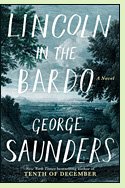Lincoln in the Bardo
by George Saunders
Reviewed by Margaret Tomlinson

Short
but deep, Lincoln in the Bardo uses a
real historical event, the death of President Lincoln's beloved son Willie, to
delve into the nature of grief, remorse and grace. The author collects and
arranges excerpts of contemporary accounts of Lincoln's presidency to
exceptional effect, particularly the varying, even contradictory descriptions of the
reception held in the White House in February of 1862 while Willie and his
younger brother Tad lay ill upstairs with what was probably typhoid fever. Most
of the novel, though, takes place in the Oak Hill Cemetery where Willie would
soon be interred, and where a cast of fictional dead characters refer to their
"sick-boxes," recall the accidents and illnesses which precipitated their
arrival in the cemetery, and fear the afterlife.
Although
the Tibetan word Bardo is not used or
explicitly defined in the course of the novel, most readers will quickly
understand the nature of the self-induced limbo in which the cemetery's
inhabitants find themselves. Bardo is the transitional state preceding rebirth in which, according to the beliefs of some Buddhists, the soul exists after death. Readers need not know
anything about Buddhism or believe anything in particular about an afterlife to
appreciate the novel's insights about mourning and life in general.
Perhaps the most remarkable thing about this novel is how playful it is, without in any way diminishing its respect for the grieving process, for the enormous tragedy of the Civil War, and for, to a parent, the heartbreaking tragedy of his child's death. Though Lincoln's point of view is not intimately developed until late in the novel, all that goes before lays the foundation for the deepening of his character through an acceptance of the mystery of suffering that Lincoln in the Bardo very credibly suggests made Lincoln into a wiser man and altered the course of American history. (2017, 368 pages)
More about Lincoln in the Bardo at Powell's Books or The Book DepositoryOther novels about Lincoln and the people around him:
Lincoln by Gore Vidal (1984), about the Presidency of Abraham Lincoln and the challenges he faced steering the United States through the Civil War. More info
A Friend of Mr. Lincoln by Stephen Harrigan (2016), about Abraham Lincoln during his twenties and thirties in Springfield, Illinois, as seen by a fictional poet in his circle of friends. More info
Mrs. Lincoln's Dressmaker by Jennifer Chiaverini (2013), about Elizabeth “Lizzie” Keckley, a former slave who became Mary Todd Lincoln's dressmaker while Mrs. Lincoln was First Lady. More info
Henry and Clara by Thomas Mallon (1994), about the couple who shared the box at Ford's Theater with Abraham Lincoln and his wife the night he was assassinated. More info
Nonfiction about Abraham Lincoln:
Lincoln's Melancholy: How Depression Challenged a President and Fueled His Greatness by Joshua Wolf Schenk (2005). More info
The Fiery Trial: Abraham Lincoln and American Slavery by Eric Foner (2010); 2011 Pulitzer Prize winner. More info
Founder's Son: A Life of Abraham Lincoln by Richard Brookhiser (2014). More info
Online:
The Death of Willie Lincoln at Abraham Lincoln Online
Back to Nineteenth-Century America
Back to Directory of Book Reviews